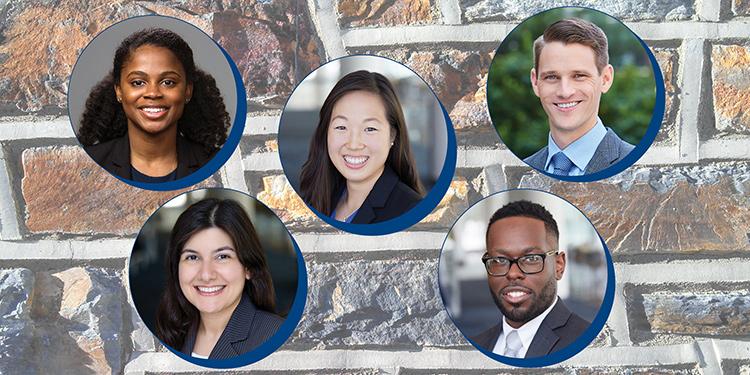
Kind and supportive classmates. Inspiring mentors. Life-changing interactions with patients. These are all facets of the Duke University medical school experience that graduating students will take with them when they move to their residency programs later this year.
We interviewed five members of the Class of 2020 about their favorite memories from their time at Duke and their aspirations for the future.
Match Day 2020 article
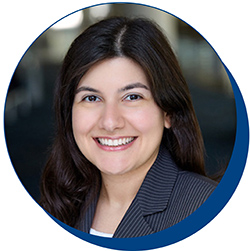
Priscila Cunha
Hometown: Rio de Janeiro, Brazil
Specialty: Pediatrics
Match: Emory University
Q: What inspired you to become a doctor?
A: Unlike many of my peers I did not always know I wanted to become a doctor. What first brought me to medicine was my interest in science and the wonders of the human body. At the time I was still quite young and did not yet fully understand that being a doctor involved so much more than that. As I decided to explore medicine volunteering with patients in a clinic by taking their vital signs and initial histories I realized how rewarding it is to be able to help others and to have their trust in such delicate aspects of their lives. I would say the connection I felt with patients is what really made me decided to pursue medicine.
Q: In what area of medicine do you hope to practice?
A: This was a bit difficult for me to choose as I enjoyed working with both adults and children in a primary care setting. The decision ultimately came to what brings me most joy, and that is working with children, so I have chosen to go into general pediatrics.
Q: What is your favorite memory from medical school at Duke?
A: It’s hard to choose among so many, but if I had to choose a clinical one it would be the birth of a child whose mother I followed in the Centering Pregnancy Program, which is group prenatal care. In this program, health appointments occur throughout pregnancy with the same providers and the same group of other pregnant women. I got to know the patients and families intimately throughout nine months of appointments; therefore, it was a magical moment to be able to not only witness the children I cared for in the womb come to this world but also be there for the families. One particularly rewarding moment was when one of my patients had a labor complication, and I was there to support her. Her partner later told me that when entering the room and seeing the sea of stranger faces he felt comforted by the fact that a familiar one, mine, was there with them.
Q: How do you hope to impact patient care and/or research in your career?
A: I’m originally from Brazil. My family and I moved here when I was 18, and my mother is not fluent in English. As a result I have accompanied her to many health appointments. Watching this once fierce and independent woman become helpless in the face of a health care system not designed for non-English speakers was what first made me realize I wanted to enter healthcare to serve the Hispanic community and non-English speakers. As I learned more about health disparities and got interested in the longitudinal aspect of primary care I knew I wanted to work in general pediatrics helping the Hispanic community with many of the challenges they face in accessing care.
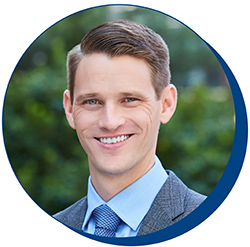
Bobby Gramer
Hometown: Stanton, California
Specialty: Neurosurgery
Match: Massachusetts General Hospital
Q: What inspired you to become a doctor?
A: Unlike some of my peers, I never experienced the Eureka effect. While I cannot pinpoint a particular moment when medicine became my purpose, I have vivid memories and deep admiration for the exceptional physician role models, remarkable people, and special relationships that have iteratively guided me toward committing my life to medicine.
Family: It starts with my parents, the two hardest working, most selfless people I have ever known. As a first-generation college student, my parents sacrificed everything to ensure I could run full speed toward any dream I could conjure. No matter what that dream was, as long as I was happy and working toward making a positive difference around me, they constantly do everything in their power to enable my dreams. I am blessed with two extraordinary parents, three spectacular sisters, and the greatest family imaginable.
Physicians: At eight years old, with my grandmother dying of an incurable brain tumor, I watched a tremendously caring neurosurgeon get on his knees in front of her wheelchair, hold her hands, look into her kind, terrified eyes and beg her, “Please, princess, just one final surgery. I promise this will be the last one.” Two days earlier her speech had disappeared. As time was dwindling, her ability to communicate with my family had vanished. She adamantly shook her head in refusal. She had already undergone one brain surgery. She was scared, tired, and defeated. The doctor remained on his knees and continued to plead. She relented. The next day she was taken back for a second brain surgery to remove more of the tumor. While she died a month later, for two of those weeks she spoke perfectly. She was able to tell my grandpa, mom, and the rest of the family everything that was in her heart. The surgeon gifted my family closure: peace of mind that continues to have an indelible impact to this day.
As a fifteen-year-old kid with life aspirations limited to obtaining a D1 basketball scholarship and playing professionally, I suffered a catastrophic knee injury. Called in from home at 10pm on a Saturday, an exuberant orthopedic surgeon burst into a small community hospital ED, brimming with energy, and seemingly making the entire room brighter, he found his way to me and exclaimed “It’s Quad-zilla” gesturing toward my bulging legs and mangled left knee. While he wheeled me to the operating room to fix the physical damage, he saw a vulnerable, distraught teenager who had just lost his dream. For the next month, he sent daily text messages or called me to check in, tell me a joke, and lift my spirits. An exorbitantly busy surgeon realized that my injury was no more physical than it was emotional and took time out of his hectic days for weeks to ensure that a kid with a broken heart got better.
Relationships: Having a sister with special needs, I have been immersed within this community for most of my life. Between starting summer camps, Special Olympics teams, and teaching initiatives, most of my life outside of medicine has been dedicated to seeking ways to help enrich the lives of and defy prognoses assigned to people with special needs. Countless times over the years, I have seen the power of love and effort obliterate limitations. My sister was fated to never live autonomously, go to college, drive, or hold a job. Instead, she has held the same job for over a decade, owns a condo, and is entirely independent. Triumphs like these urged me to find a career where such meaningful changes could be replicated. I found that it is not always practicable to spend years of love and care to affect such change, and in the process discovered neurosurgery. I will never forget the first case I ever witnessed. A 14-year-old boy, incapacitated by dozens of seizures every week, underwent a procedure where after carefully mapping his brain, a small piece of cortex was removed – the nexus for where his seizures originated. For the next two years he did not have a single seizure. He was empowered to fully engage in school, date, drive, and thrive as any teenager should be allowed. It clicked that this is exactly what I was meant to do with the rest of my life.
Q: In what area of medicine do you hope to practice?
A: In meeting a person who requires neurosurgery, one encounters a person staring down the absolute cruelest, most distressing face life can wear. I cannot imagine a greater personal fulfillment than to earn the trust and privilege to walk hand-in-hand with these patients. Often times there is an answer that resoundingly defeats such a menace, but not uncommonly it must be conceded that the limits of science have been reached. Remaining hand-in-hand with patient and family as they march down life’s most unnerving path is a privilege I eagerly look forward to working tirelessly to defend. Harvey Cushing, a pioneer of modern neurosurgery, said, “A physician is obligated to consider more than a diseased organ, more than even the whole man – he must view the man in his world.” This principle captures the foundation upon which I hope my career lies. Beyond preventing death and treating symptoms, neurosurgery, distinct from so many other vocations, addresses what makes us human, what it means to live. I believe that understanding the person behind the patient is more salient in neurosurgery than any other practice, making the infinite learning curve that lies ahead not just technical and operative, but humanistic. This profound nuance excites me more than anything I have ever known and compels me to dedicate my life’s work to learning and refining the art of neurosurgery.
I imagine no matter how much I prepare for a life in this field, I will feel unsettled countless times throughout my career. As an intern at 3 a.m, a patient’s life will depend on an answer that I do not immediately have. As a junior level attending, the safety net will vanish. “Without such gifted people bolstering me, do my abilities warrant a human life be entrusted to my hands?” Throughout my entire career, there will be cases and outcomes imploring what I should have done differently. And no matter how much experience I amass, I hope there never comes a day that I am impervious to the insecurity of not knowing. I anticipate that in dedicating my life to neurosurgery there will certainly be occasional feelings of failure and frequent feelings of unease. At times, this will be because, as a field, the answer is yet to be found; other times, it will be a failure that lies squarely upon my shoulders. But should this not be the case in choosing a life where missteps are not only mortal, but worse, destine someone to live as a mere vestige of who he or she once was? The immense complexity, the privilege to restore not only the nervous system’s function, but to safeguard what makes someone human, is exactly why I want to spend the rest of my life working to advance this humbling practice.
Q: What is your favorite memory from medical school at Duke?
A: Duke is an intensely special place. This specialness repeatedly distills down to the people that call Duke home. Since arriving to Durham over five years ago, I have been continually awestruck by my extraordinary peers. I have been lucky to call some of the smartest, most caring people I have ever met my classmates. The pervasive culture of collaboration and the faculty’s sincere concern with student development and future career success have made my time as a Duke medical student an immeasurable privilege. Early on in medical school, I realized that I had two unrelated interests within neurosurgery. The faculty graciously worked with me to allow me to do two separate master’s degrees, one of which led me to Uganda multiple times and the other to live in Toronto, the global epicenter for my research, for two years. Without such supportive classmates and mentors, I would be nowhere near where I am today.
Q: How do you hope to impact patient care and/or research in your career?
A: As a medical student, I discovered distinct passions bounding the poles of the neurosurgical spectrum: how to better stimulate the nervous system and how to better deliver neurosurgery to low resource settings and bridge the socioeconomic chasm in care. During my research fellowship at the University of Toronto, I was able to work with brilliant people while studying how to use signals we record from the human brain to improve how we stimulate circuits deep in the brain to treat limbic, metabolic, cognitive, and movement disorders such as depression, obesity, Alzheimer’s disease, and Parkinson’s disease. In Uganda, I am working to improve neurosurgical capacity in low-resource settings via innovative neuroimaging in traumatic brain injury patients. While technically dissimilar, a common thread has trussed each patient to the other: some part of who they once were, an integral element of how they identified with their world, internally, outwardly, or both, has ebbed or vanished.
Above all, I hope to become the most competent, compassionate, and complete neurosurgeon I am capable of – one who never stops striving to do better for patients. With my love for neurophysiology, global health, and palliative care, scientifically, I hope to carve out a career I can help to innovate technology to more precisely modulate diseases of the central nervous system. In terms of shifting practice, I want to remain intimately involved in reducing disparities in neurosurgical care globally and, as my career progresses, remain cognizant of how we wield and deliver ever-evolving technologies and treatments and, accordingly, how we approach end of life care in patients as these changes emerge.

Cierra Hong
Hometown: Orlando, Florida
Specialty: Orthopaedic Surgery
Match: Stanford University
Q: What inspired you to become a doctor?
A: Growing up with Medicaid, my family experienced the long waits and delays in receiving healthcare which became especially difficult when my father had cancer. Our quality of life was severely impacted by factors that were out of our control, and it motivated me to be at the front lines as a physician addressing this issue at some capacity.
Q: In what area of medicine do you hope to practice?
A: I am pursuing a residency in Orthopaedic Surgery with a strong interest in specializing in oncology or adult reconstruction (i.e. hip and knee replacements). It’s a field where quality of life is the main issue we address in our clinical and surgical encounters, and I believe there is room for growth in how we treat and manage patients from underprivileged backgrounds.
Q: What is your favorite memory from med school at Duke?
A: Rather than a specific event, I remember the people I met from Duke during medical school who will be my lifelong mentors and friends. No matter what I was going through, they were there 24/7 and gave me the confidence and guidance to succeed down the path I chose.
Q: How do you hope to impact patient care and/or research in your career?
A: In addition to practicing at an academic institution where patient care is less dictated by their insurance, I hope to get involved in clinical trials and improve accessibility and education for patients of different socioeconomic backgrounds.
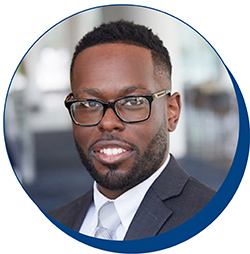
Melvin Larker
Hometown: Prince George’s County, MD
Specialty: Cardiology
Match: Johns Hopkins University
Q: What inspired you to become a doctor?
A: Becoming a doctor, for me, was a calling. I have overcome many trials and tribulations throughout my life that fueled my passion for medicine. Being a patient in this healthcare system as a young child, and remembering the gentleness, the compassion, and the care that some doctors exuded towards me inspired me to become a doctor. I want to impact patients just as those physicians did for me.
Q: In what area of medicine do you hope to practice?
A: I plan to practice Cardiology in the future. Heart disease is the number one cause of death in our country, and underrepresented individuals and groups are impacted disproportionately. I plan to care for all patients and work vigorously to impact health outcomes.
Q: What is your favorite memory from med school at Duke?
A: I love DUKE! I have so many amazing experiences and memories from my time here at Duke. From working with amazing attendings, residents, and fellows to interacting with great patients. I specifically recall a patient who was dealing with tremendous financial hardships while battling numerous illnesses; she just wanted to give up on everything. After a few tears had been shed, we were able to make great strides in her health. The mere act of being personable and empathic and how that impacted her outlook on life and health will forever be one of my favorite memories here at Duke.
Q: How do you hope to impact patient care and/or research in your career?
A: I love interacting with patients. While my career will be focused around the care I provide to patients, I hope to impact patient care by focusing on improving representation and Health Disparities. Representation matters – bringing diversity to the team, and different perspectives to many topics can impact the care we provide to our patients. Differences in health outcomes and health disparities remain a challenge. I plan to continue research efforts in not only identifying health disparities but providing actionable ways in which we can attain health equity.
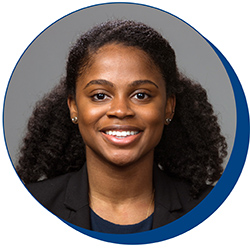
Arakua Welbeck
Hometown: Accra, Ghana
Specialty: Orthopaedic Surgery
Match: Washington University in St. Louis
Q: What inspired you to become a doctor?
A: I am blessed to have been raised by my incredible mother, who is a professor and pediatrician back home in Ghana. Her selflessness is unparalleled, and it is hard to witness that manifest so perfectly in her work and not have a strong desire to emulate her. In addition, I grew up near a large hospital back home, and saw pretty early on how the lack of accessible healthcare can impact those less fortunate in society. Moving here for university meant that I quickly learned how universal the issue of health disparities is. I am hoping that I can tailor my career as a physician and surgeon to help alleviate some of these disparities, particularly as a minority.
Q: In what area of medicine do you hope to practice?
A: I’ll be going into Orthopaedic Surgery. I am currently unsure as to what I will end up sub-specializing in, but hopefully something that is translatable and necessary in the global health setting.
Q: What is your favorite memory from medical school at Duke?
A: Broadly, my time serving on the board of and fellowshipping with the Duke chapter of SNMA has been grand. The Student National Medical Association (SNMA) is a national organization aimed at supporting underrepresented minority medical students and working with underserved communities. I am grateful for all the relationships SNMA has helped me foster!
Q: How do you hope to impact patient care and/or research in your career?
A: Entering into a specialty that is not nearly as diverse as it should be, I am excited to play my part in making our workforce more reflective of the populations we serve. I aspire to contribute to improving healthcare access both locally by serving the underserved, and globally, particularly in Ghana. My research will depend largely on my chosen subspecialty, but I do hope I can partake in global health research and innovation in those spaces.